Canada to Restore Citizenship Rights for ‘Lost Canadians
The federal government has announced plans to restore the rights of “lost Canadians” by enabling Canadians born abroad to pass down citizenship, even if their children were also born outside the country. Immigration Minister Marc Miller introduced the legislation on Thursday, aiming to reverse the controversial “second-generation cut-off rule” implemented by the Conservatives in 2009.
“There’s no doubt that Canadian citizenship is highly valued and recognized around the world,” Miller stated. “Not everyone is entitled to it. But for those who are, it needs to be fair.”
The proposed changes will require Canadian parents to demonstrate that they have spent at least three years in Canada before the birth or adoption of their child to pass on citizenship. Miller described this requirement as “a reasonable limit to what is a substantial connection to Canada,” asserting that it addresses previous unfairness.
The legislation comes in response to a December ruling by an Ontario court that found the “second-generation cut-off rule” unconstitutional and disproportionately harmful to women. The court gave the Trudeau government until June 19 to amend the law.
NDP immigration critic Jenny Kwan, who assisted in drafting the legislation, joined Miller at the announcement. “I’ve talked to family members who’ve been separated from their loved ones because of this unjust law that Conservatives brought in 15 years ago,” Kwan said.
Don Chapman, an advocate for “lost Canadians” who coined the term and had to reapply for his Canadian citizenship, praised the legislation as “momentous.” He highlighted its significance, noting, “This bill will be the first time in Canadian history that women achieve the same rights as men in the Citizenship Act.”
The 2009 rule was introduced by former Prime Minister Stephen Harper to address concerns over “Canadians of convenience,” particularly after a costly evacuation of Canadian citizens from Lebanon during the 2006 war between Israel and Hezbollah, which cost taxpayers $85 million.
McGill political science professor Daniel Béland acknowledged the challenges and benefits of Canadians living abroad. “Canadians living abroad sometimes can be a burden for the government in the sense that if we need to evacuate them, during an armed conflict, or if they come back to the country to seek healthcare and so forth,” Béland said. “But they are also a potential source of economic prosperity because we know that diasporas all over the world play a major role in national economies.”
Conservative immigration critic Tom Kmiec criticized the Trudeau government’s handling of immigration issues. In a statement to Global News, Kmiec called Miller’s comments “disingenuous” and said, “Justin Trudeau has broken our immigration system and allowed fraud, chaos, and delays to run rampant.”
While the number of citizens affected by the proposed changes is not yet clear, Miller emphasized the necessity of the legislation, labeling the 2009 law as “manifestly unfair.”
The new legislation marks a significant shift in Canadian immigration policy, aiming to rectify past injustices and ensure fair treatment for all Canadians, regardless of their birthplace. As the bill progresses, it will be closely watched for its potential to reshape the landscape of Canadian citizenship and diaspora relations.



